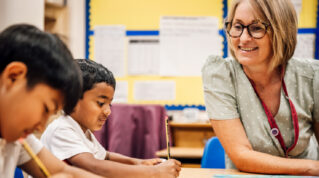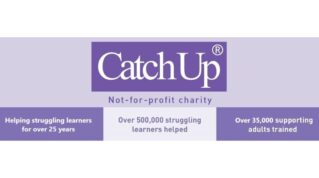First aid is already a national curriculum fixture but St John Ambulance has developed a street first aid programme that goes beyond traditional first aid, for some of the real-life situations young people may find themselves in, with ever increasing crime rates and street violence.
Targeting students in underrepresented areas in London, West Midlands and the North-East, where knife crime rates are high, the Young Responders programme offers life-saving street first aid skills via workshops delivered in school.
Its aim is to boost first aid confidence among students aged 11-18 – and its diverse key audience are young people who may be at risk of street violence, looked after young people, young carers, and those at risk of not being in education, employment or training (NEET).

Hands on street first aid from how to treat a stab wound and other violent crime injuries, to spiking, and keeping safe around drink and drugs are delivered by a St John facilitator in 90 minute sessions and use real life scenarios. Students also get to learn traditional physical first aid skills such as how to put a person in recovery position, as well as tips on mental health awareness.
Workshops Include
- Physical First Aid
- Mental Health First Aid Awareness
- Street Violence First Aid (spiking, alcohol and drugs, stab wound injuries)
Key Features
- Context-based scenarios for young people
- Learning key skills to manage health-related incidents with effective First-Aid
- Free
- Ideal for PSHE lessons, group interventions
- An interactive way to incorporate First-Aid in the National curriculum!
- 60–90-minute sessions
Around 6,000 students across the target areas have been reached through the £1m programme, which launched in March after research and development. Funded by People’s Postcode Lottery from funds raised by players of People’s Postcode Lottery, St John is hoping to secure a partner for funding into 2024 so the programme can continue, and possibly extend to other areas.
During the summer break Young Responder sessions have been delivered to around 1,000 students, through organisations including the Holiday Activities Food programme (HAF) programme founded by Marcus Rashford.
Young Responders is getting great feedback from students and teachers.
Student Emanuele De Felice, 16, a student at south London Trinity Academy said, ““I found the session good, learning about spiking was really useful as it’s something that happens in real life. Knowing what to do is beneficial to you, those around you as well as people you don’t know.”
And teacher, Jenny Lee Kearns believes the sessions really help. She said, ““We at Trinity Academy believe every child should have the knowledge to perform basic first aid. This is especially important considering the current knife crime rates and the relative deprivation in the area. After completing the sessions, our students are more prepared to step in if they were to witness a violent crime or injury.”
St John are keen for schools and colleges to take advantage of the free programme.
Director of Youth and Education at St John, Paul Evans said, “It is a sad reality, but St John is adapting to the ever-changing needs of communities. If your best friend was stabbed or attacked in the street – would you know what to do? If their drink was spiked, or they’d had too much to drink, and had collapsed, having the skills to step in during those vital seconds makes all the difference – it saves lives.”
* Schools can now take advantage of St John’s iDEA Badge – a free, digital first aid badge which aims to work alongside the compulsory teaching of first aid in schools. The badge takes no longer than 40 mins to complete and covers advice for how to CPR and using a defibrillator, recovery position, chest pain, severe bleeding and choking. More information is available at: First Aid | iDEA
















Your thoughts